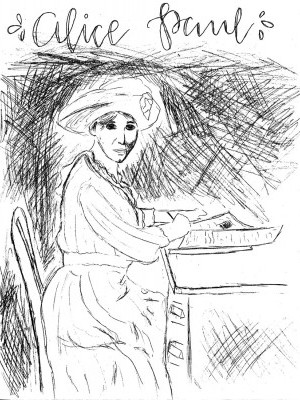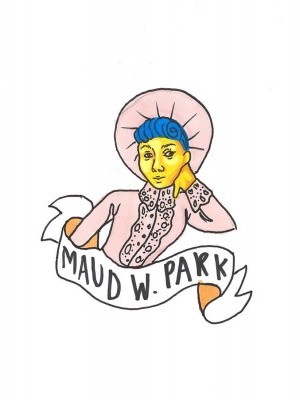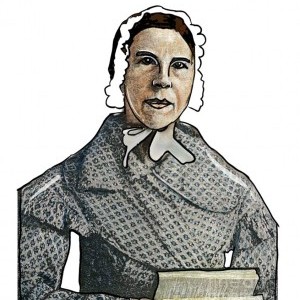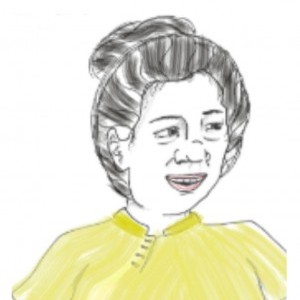Caitlyn, Julia, Perry, Chole & Emma
Castilleja School | Palo Alto, CA | 8th
Historical Figure I Admire
Alice Paul
Alice Paul pioneered the way for women's suffrage and is regarded as the mother who proposed the ERA (Equal Rights Amendment). She was born in 1885 in Mount Laurel, New Jersey, and obtained degrees from Swarthmore College as well as from the New York School of Philanthropy. She wrote the initial draft of the Equal Rights Amendment, which she submitted to Congress in 1923. Concerning the Civil Rights Act of 1964, Alice Paul succeeded in including a clause to Title VII that addressed sexual discrimination. As an active member and leader of the World Woman's Party, the Woman's Research Foundation, and the League of Nations, her activism concerning women's rights expanded to an international level. Throughout her life, Alice Paul ignored the norms and regulations inflicted upon her because of her gender, and continued advocating for the ERA and women's rights. However, the ERA was short of ratification by three states by the 1982 deadline. Alice Paul passed away in 1977 in Moorestown, New Jersey.
Alice Paul made influential contributions, advocating for women's suffrage as well as combating the societal discrimination confronting women. She collaborated with women from Britain, including Lucy Burns, to advocate for women's voting rights, and additionally organized a group called the “Silent Sentinels” to protest outside the White House with signs that read, “How long must women wait for liberty?” Due to her actions, Alice Paul was arrested for “impeding traffic” and when jailed, she went on a hunger strike in protest. She established the National Woman's Party and led the National American Woman Suffrage Association to advocate for women's voting rights. In addition, Alice Paul became chairman of the National American Woman Suffrage Association in 1912 and established the Congressional Union for Women's Suffrage in 1913, which became the National Woman's Party. In part due to her efforts, the 19th amendment was ratified in 1920, which constitutionally guaranteed voting rights for women. Alice Paul's suffrage legacy will forever be remembered in history. As Alice Paul once said, “There will never be a new world order until women are a part of it.” –Caitlyn & Julia
Historical Figure I Admire
Maud Wood Park
Maud Wood Park was born January 25, 1871, and had a privileged childhood. She attended St. Agnes School in Albany, then Radcliffe University in Cambridge, Massachusetts, graduating in 1898. After many years of work, she died a respected suffragist on May 8, 1955.
After her graduation from Radcliffe, Park co-founded the Boston Equal Suffrage Association for Good Government in 1901, and worked as the executive secretary for 12 years. During the time, the old generation of suffragists was dying out, and Park found herself one of few suffragists from the new generation. Before her second husband's death, she led the congressional lobbying effort of the National American Woman Suffrage Association from 1917 to 1919. She also guided DC tourists who volunteered to help with the effort. WWI was happening at the time, so Congress's main concern was the war. However, through her connections, Park was able to form a special committee on women's suffrage. The committee approved an amendment which eventually became the 19th Amendment. Her knowledge of both the legislative process and techniques of lobbying contributed immensely to the success of the campaign for a suffrage amendment in the Constitution. –Chloe, Perry & Emma
What the Project Means to Me
The United States of America was founded by powerful men with values and ideals reflected in the Constitution. These men did not realize the impactful and beneficial contributions that women could have on society. Therefore, women have not always been recognized as having valid opinions. For hundreds of years women did not have the right to vote. The rules of a democracy applied only to Caucasian men. Americans called their system of voting a democracy, but democracy means nothing when not all voices are included. One hundred years ago, when women won the right to vote, America became a more inclusive and equal country. This was a momentous achievement for women in America. They were now one step closer towards an equal world.
Women fought long and hard to have a say at the table. As Alice Paul, one such woman, fought for the female vote, barriers of sexism and misogyny slowed the process, and suffrage was obtained much too late. Alice Paul was an American hero whom I look up to and deeply respect. She fought for my right to speak up and voice my opinion. She protested, marched, was arrested and went on strike for that right. When I am old enough to vote, I will be standing at that ballot site ready to make the best decision I can. I owe it to the great women before me who gave me this privilege that not all of them were able to have.
While researching women suffragists, I was able to realize how important my vote really is. My political representatives should reflect my community's values, ideologies, and beliefs. Women and men, black, brown, or white should be represented in government. That is why voting for the president is very important but so is voting for your congresspeople.
Especially in this day and age, women's voices need to be heard more than ever. When women are discriminated against or abused, we must take action. The best way to take action is to vote. Thanks to the hard work and determination of the brave women before us, millions of women, young and old can take action. They can contribute to their country, and engage in democracy. –Julia
Explore the Archive
More From This Class
Click on the thumbnails below to view each student's work.Deadline Extended
There's still time to join Women Leading the Way.
Become a part of our storytelling archive. Enroll your class today.
Join the Project





